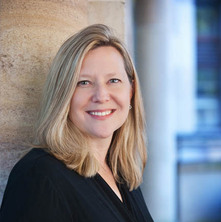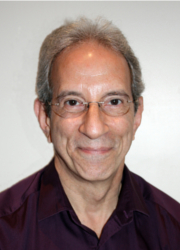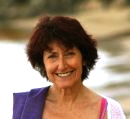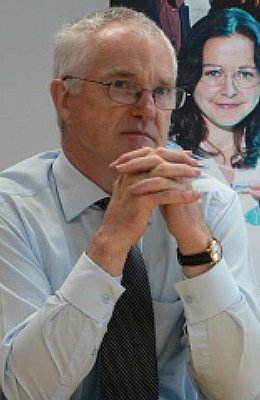Claire Harris is the conference convenor for the Australian Science Communicators National conference for 2014.
Claire is a science communicator specialising in agriculture, environment and natural resource management science and technology. She’s worked as a scientist, project manager and communication specialist with government and research agencies in Australia and the United Kingdom.
After joining the Australian Science Communicators in 2005, Claire has been active in local branches and National Executive, and was National President for part of 2013.Claire joined CSIRO in 2009 to work in science communication for climate adaptation, environment and agriculture and was seconded to the Australian Government Department of Agriculture to assist with carbon farming communication in 2012. She’s just one of the many great people you can meet at the Australian Science Communicators conference in Brisbane, for 2014.
Tag Archives: ASC14
#ASC14 Past (current) presidents – Joan Leach
Thank you to Simon Chester for providing us with this president’s article.
With 2014 marking the 20th anniversary of the Australian Science Communicators (ASC), it’s a worthwhile time to talk to some of its past presidents, and find out some of their fondest memories, what drew them to science communication, what the big issues where back when they were steering the ship, and what issues remain now and into the future.
Joan Leach is the current President of ASC, and Convenes the Science Communication Program at the University of Queensland. She is also Associate Professor of Rhetoric and Deputy Head of the School of English, Media Studies, and Art History at UQ.
Joan believes that there are 2 sets of issues for Science Communication as a field of research and professional practice.
“First, there are the communication issues that arise because of the directions that science is taking. So, climate adaptation research, neuroscience, particle physics, and the wide diversity of research challenges science communicators to come up with strategies for dissemination, for engagement.
“But also, there are a range of issues that emerge about science communication itself. Should it be a field of advocacy or/and criticism about the role of science? When is communication most effective? How do we evaluate our effectiveness? To be a successful science communicator, you need to engage both these issues and that’s a big ask—basically, you need to be a reflexive practitioner.
Likewise, the issues facing science communication in the future will also fall into the two camps of research and communication.
“On the issues that research brings to the table, climate adaptation and our post- or trans-human future that I think are the biggies. And, they are related issues. With climate change a reality, alongside the real changes technology can bring to our brains and the rest of our bodies, there are some serious questions about what the future of humanity looks like. This also covers questions of our relation to each other and the planet. Framing these questions is a huge task. And these ‘big’ questions relate to how we see smaller research results and communicate those. And, if we want to upstream some of these questions and engage larger audiences before crises loom even larger, we have a huge task in front of us.
“On the communication front, I think questions of interdisciplinarity are increasingly important. By that, I mean synthesising insights from across the humanities, social sciences, and natural sciences. A lot of lipservice is given to interdisciplinarity, but to really achieve it is a huge challenge that includes synthesis, but also knowing when approaches from one discipline are compatible (or not) with those from another.”
Joan is optimistic about her time ahead as ASC president.
“I’d love to look back at this time and see the growth of the ASC and an increase in the organisations relevance to the big questions of science in Australia and the region.”
Science communication has always been an interest of Joan’s, and her broad training complements it well.
“I’ve always been drawn to science communication because of the mix of intellectual and practical challenge directed at things that matter. Also, this field means that I don’t have to ‘turn off’ bits of my brain; science communication is creative, critical, analytic, and practically challenging. In my education, I’ve formally studied biology, biophysics, philosophy, rhetoric, classics, and history and philosophy of science. And they all matter to science communication (if you buy me a drink, I can tell you how!).
#ASC14 Past presidents – Jesse Shore
Thank you to Simon Chester for providing us with this president’s article.
With 2014 marking the 20th anniversary of the Australian Science Communicators (ASC), it’s a worthwhile time to talk to some of its past presidents, and find out some of their fondest memories, what drew them to science communication, what the big issues where back when they were steering the ship, and what issues remain now and into the future.
Dr Jesse Shore is the Principal of Prismatic Sciences, and was ASC president from December 2009 to November 2012. He noted that science was becoming increasingly politicised during his tenure.
“In 2010 the ASC welcomed the increased emphasis by the federal government to engage all Australians with science. In stating their intentions they recognised that effective science communication would play a central role to achieve their goals.
“Science and technology became increasingly politicised as diverse commentators and various experts took opposing sides on issues such as climate change, stem cell research, nanotechnology, medical practices and other usual suspects. Many science communicators found that their usual approach often couldn’t compete with the emotional rhetoric of high profile, but misinformed, voices.
“Other influences during 2010-2012 were the rapidly evolving forms of data visualisation, apps and games and their increasing use as a tool to communicate science. Social media continued to grow in importance, and the NBN offered future hope – but not short term use.
“I’m pleased that [during my time as president] the ASC developed increasingly closer working ties with the Inspiring Australia Strategy of the federal government. The ASC partnered with various groups to carry out projects funded by Inspiring Australia.”
Dr Shore believes that technology will shape science communication in the future.
“Science communication will have to adopt and adapt to new technology such as 3D printing and people’s increasing interconnectedness though mobile media. We’ll need ways to reach audiences who are becoming increasing fragmented into smaller and more diverse niches (many of which overlap in some way).”
Jesse’s interest in Science communication grew out of a practical need early in his life as a scientist.
“I wanted to be a scientist ever since I was 12 years old and I succeeded, becoming a geologist. As a post-grad in California, I enjoyed my research but found that talking about its arcane details caused instant ennui in the listener.
“So, I gradually learned that whenever a pretty gal at a party asked me if I studied earthquakes I would lie and answer ‘yes,’ which would generally develop into an enthusiastic conversation. After many dates I am still improving how to lie about what I do.”
Jesse will be speaking at the BrisScience Storytelling of science event on Sunday 2 February. http://2014conf.asc.asn.au/the-storytelling-of-science/
“I’ll talk about my circuitous path to becoming a science communicator (theatre was involved), my approach to creating a story, and go through one or two science stories from my museum exhibition work. I think a tennis racquet may be involved.”
#ASC14 Past presidents – Alison Leigh
Thank you to Simon Chester for providing us with this president’s article.
With 2014 marking the 20th anniversary of the Australian Science Communicators (ASC), it’s a worthwhile time to talk to some of its past presidents, and find out some of their fondest memories, what drew them to science communication, what the big issues where back when they were steering the ship, and what issues remain now and into the future.
Alison Leigh, now Editorial Director at the World Congress of Science and Factual Producers, was the third president of ASC. Back during her presidency, the issues plaguing science communication were quite similar as those seen today.
“We worried that science and science journalism were not taken seriously by politicians or by news editors – plus ça change!
“A main focus of our organisation was to encourage high journalistic standards throughout the science communication profession. Scientists were reluctant communicators. We felt our mission was to encourage them to understand the importance of communicating their work, to talk in language that the lay person can understand, and to understand the pressures that journalists are under to meet their deadlines (and this was long before 24/7 news!).
“Science was not “sexy” – the ‘two cultures’ were alive and well. We used to discuss how we might try to deal with the stereotype images of science and scientists.”
Alison believes that many of the issues faced during her presidency will remain over the coming decade, too.
“Climate science is the most obvious example… but it’s not just that science and science journalists (not many left!) are not taken seriously: they are up against dark forces. It does not suit governments of the day – and their corporate supporters who also have controlling shares in what gets printed in the media – to take action on human induced climate change, so they prefer to deliberately obscure or challenge the message. Opinion and commentary passing as journalism also adds to the problem of misinformation.
However, there has been one positive change over the last TIME:
“GEEK IS CHIC! Here at least there is hope – nerdy science has become mainstream in popular culture. Physics professor Brian Cox is a super star in the UK. ‘Science’ finds its way into life style TV shows about the science of the food we eat (Jimmys Food Factory, Food Unwrapped), and the internet is full of all sorts of creative, and often very funny, podcasts about the kind of hard science that mainstream TV shies away from .”
Alison was a successful reporter for the BBC before migrating to Australia and – almost serendipitously – ending up in science communication.
“I emigrated to Sydney from the UK in 1988 – bicentennial year – fully expecting my on-screen career as a BBC TV and radio reporter /presenter to continue to flourish here. Wrong. I was ‘too old’ and ‘too English.’ Yikes! What to do? Try my hand at producing? My current affairs credentials landed me the job of Producer, Media Watch, with the task of getting series one to air.
“Next thing I know, after that baptism of fire, I’m being courted by the Executive Producer of Quantum – to be the Series Producer – i.e. day to day manager of that show. Saying yes to that job changed my life – and my focus.”
At the ASC conference, Alison will be presenting a selection of clips that represent some of the major trends internationally in science programming taken from mainstream, and internet, TV. Plus a look at the new on-line science game from ABC with Bernie Hobbs.
#ASC14 Past presidents – Toss Gasciogne
Thank you to Simon Chester for providing us with this president’s article.
With 2014 marking the 20th anniversary of the Australian Science Communicators (ASC), it’s a worthwhile time to talk to some of its past presidents, and find out some of their fondest memories, what drew them to science communication, what the big issues where back when they were steering the ship, and what issues remain now and into the future.
Toss Gascoigne, now a consultant in science communication, has been involved with ASC since its formation.
“I was involved in ASC from the beginning, helping convene the initial planning meeting at the National Press Club in Canberra, and working on the Executive for the first 10 years.
“When ASC started, it unleashed this huge wave of support, because so many people worked in professional isolation, and they wanted colleagues to talk to and share experiences. 375 people signed up as Founder Members, as a sign of support for ASC – and that was even before we wrote the constitution and had the first meeting!
“ASC started just before the first courses in science communication began at Australian universities, so … people came in from backgrounds in journalism or teaching, or science, or editing and writing or PR.
Toss began his science communication journey as a teacher.
“I was a high school teacher in Tasmania, in English and social sciences. Teaching was great (and so is Tasmania) but one can have too much. So I moved back to Canberra and took up an editing position (succeeding Will Stefan) with CSIRO’s Centre for Environmental Mechanics on Black Mountain.
“What I found was I loved working with scientists – their work is so interesting, their logic so compelling, and the problems they approach so relevant.
“I’m interested in how science communication has emerged in Australia (and other countries over the world) over the last 35 years, and what were the steps and what preceded it. So, when were the first university courses in science communication? When did research in these areas start? What is our history of writing papers and organising conferences? What organisations have we formed, and how does Australian experience with the rest of the world.”
Toss will be talking about the history of science communication in Australia and New Zealand at the SCANZ breakfast event (http://2014conf.asc.asn.au/schedule/special-events/scanz-asc-breakfast-event/), and during a panel (http://2014conf.asc.asn.au/schedule/the-emergence-of-modern-science-communication-in-australia-and-new-zealand-toss-gascoigne/) as part of the ASC conference.
#ASC14 Podcasts – Jesse Shore, Jenni Metcalfe And Joan Leach At The ASC National Conference
Her research centers on public engagement with science, medicine and technology and she has been active in the Australian government’s recent initiatives toward “Inspiring Australia”. She is currently researching the role of popular science in the globalisation of science since the 1960s, a project funded by the Australian Research Council. Jenni Metcalfe is the Director of Econnect Communication. She also lectures in science journalism at the University of Queensland. She has been a science communicator for more than 24 years, working as a journalist, practitioner and researcher in this area. She was President of the Australian Science Communicators (ASC) from 2005 to 2007. During that time, ASC hosted the World Conference of Science Journalists. Dr Jesse Shore, of Prismatic Sciences, is passionate about engaging the community with science and in looking for ways to weave together the arts and sciences. He has been developing science based exhibitions and events since 1984, and was President of the Australian Science Communicators from 2010-2012. His business, Prismatic Sciences, produced five travelling exhibitions for the Royal Australian Chemical Institute for the 2011 International Year of Chemistry and he manages the ongoing national tour.
Jesse previously worked at the Powerhouse Museum in Sydney as an exhibition project leader and Senior Curator of sciences. While at the museum he was one of the founders of the Ultimo Science Festival, a major National Science Week activity. He is currently collaborating with an artist to create artworks which have a science slant.
#ASC14 Podcast – Dr Rod Lamberts – Presenter at the ASC National Conference
Dr Rod Lamberts is the Deputy Director of the Australian National Centre for the Public Awareness of Science (CPAS) at the Australian National University, a founding partner of the Éngstrom Group, and in 2012 was elected National President of the Australian Science Communicators (retired injured, 2013).
He has more than 18 years experience as a professional facilitator and researcher, and is considered an expert of international standing in the field of science communication. More recently he has teamed up with another avid science communicator, Dr Will Grant – and together they produce SCOM BOMB, which will be appearing at the Australian Science Communicators conference in Brisbane.
President’s update: Welcome to Brisbane for #ASC14!
Thank you to newly appointed ASC President Joan Leach for the conference welcome.
New ASC President Welcomes you to Brisbane for 2014 Conference
I was delighted to be voted in as 2014 ASC President late last year. And while I claim no credit for the upcoming conference—that credit goes elsewhere and I will be flagging ASC members who have gone ‘above and beyond’ at the conference—I very much look forward to welcoming ASC colleagues to my home city of Brisbane in February! If you haven’t quite decided whether to come or haven’t yet registered for the conference, please do so. The program is rich—we will all learn something—and there are ample opportunities to catch up to people with whom you’ve been meaning to have that coffee or drink. There are also networking opportunities to set up new projects and make new connections as well as learn new skills and research and project outcomes.
20 Years of ASC
2014 also marks an important milestone—20 years for the ASC. Let me know if you have specific ideas for marking this occasion, and I’ll be reporting in from time to time on anniversary activities. The conference will be a good opportunity to give an extra nod to all the members of ASC who have advocated for science communication over the past 20 years. There is a lot to be proud of for ASC members, including being positioned to make a difference for the future. This year also marks the Australian Academy of Science’s 60th year and members will be involved in various ways marking that anniversary as well. Finally, I will risk immodesty by flagging my own personal anniversary—10 years in Australia. I attended my first ASC/AMWA conference in Coolangatta in 2004 shortly after I landed in Brisbane. ASC and AMWA members I met at that conference are still valued colleagues today and I credit ASC with helping to make me feel professionally ‘at home’ in Australia. This is perhaps a key reason that, after 10 years of ASC helping me, I decided to sit in the hot seat to advocate for ASC members.
Getting the next 20 years off to a roaring start
ASC members offer an embarras de richesses when it comes to future planning. I would like to harness this abundance of ideas for planning ASC projects, programs and advocacy. If you have ideas or would like to volunteer some time on behalf of the organization, please contact me at j.leach@uq.edu.au. As I see it at present, my role is one of advocacy for members. I would like to be certain that when there are science communication ‘problems to solve’, issues to address, or ideas to be generated, ASC members are at the forefront of decision-makers minds. Among our members are those who put on the best engagement events, do the best evaluation, plan communication strategies that are effective, and do some of the best research in the area. My goal is to make sure a broader range of organisations and people know that the future of science communication is being planned now by ASC members.
I look forward to catching up or meeting in you Brisbane in February!
#ASC14 highlights
Thanks to Claire Harris for sharing her highlights.
- Over 100 distinguished speakers across disciplines and industries
- Leaders and visionaries of our time such as:
- Ian Lowe (Emeritus Professor of Science, Technology and Society at Griffith University and President of the Australian Conservation Foundation)
- Susannah Eliott (CEO of the Australian Science Media Centre)
- Drew Berry (Biomedical Animator at Walter Eliza Hall Institute of Medical Research), Lloyd Godson (Ultramarathon running aquanaut and adventurer)
- Dr Geoff Garrett (Queensland Chief Scientist)
- Prof Léonie Rennie (Emeritus Professor at Science and Mathematics Education Centre, Curtin University)
- Warwick Anderson (CEO of NHMRC, Australia’s major governmental funding body for health and medical research)
- Bernie Hobbs (Award-winning science writer and broadcaster with ABC Science Online).
- Over 200 attendees from all career stages from students to leaders in their fields
- Attendees from Australia, New Zealand, Africa, USA and Japan
- Three days of main conference program featuring case studies, talks, roundtable discussions, workshops and training, and debates.
- A program designed to inspire. With a theme of Insight, Impact, Innovation, ASC2014 emphasises innovation in science communication stimulated by understanding our audiences, using visual communication and new media, and demonstrating the impact of our efforts.
- A special Sunday with a hands-on community storytelling workshop (fully booked but waitlist available) and a public event ‘The Storytelling of Science: a triple anniversary celebration’ featuring Tim Flannery (Chair of the Climate Council), Lynne Malcolm (ABC Science), Jenny Graves (Australian Academy of Science Secretary for Education and Public Awareness)
- A spectacular sci-art exhibition (called SPECTRUM), a SCINEMA screening, poster showcase and speed networking (Monday 3 February)
- A first ever joint Science Communicators New Zealand and Australian Science Communicators breakfast event. Learn about the evolution of science communication in New Zealand and Australia with this panel featuring: Ian Lowe, Toss Gascoigne (Director at Toss Gascoigne & Associates), Jean Fleming (Professor of Science Communication and Associate Dean of Outreach at the University of Otago, New Zealand) and Jenni Metcalfe (Director of Econnect Communication)
- The conference dinner featuring Robyn Williams (ABC Radio National’s The Science Show and Ockham’s Razor) presenting the Unsung Hero of Australian Science Communication Award (Tuesday 4 February)
- The best networking you’ll find: cross-industry, cross-geography and cross-disciplinary.
- A full stream of professional development including: web building, editing, animation, online strategy, commercial foundations, getting published, journalism and storytelling.




